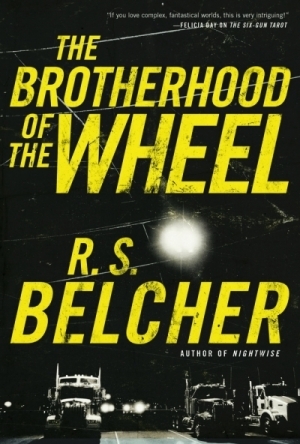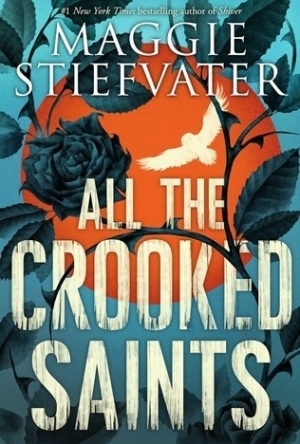Haley Mathiot (9 KP) rated Pilgrims Don't Wear Pink (Pilgrims, #1) in Books
Apr 27, 2018
The good:
-The plot was fun. I enjoyed the storyline, the twists and turns, and the ending. Some of it I saw coming, some of it I didn't—but even when I expected it, I enjoyed seeing it work out.
-The characters: Dev (Libby's extremely gay friend) was fabulous in every sense of the word. If he were real, he'd be my buddy, even though he'd be constantly criticizing my shoes. Garrett, the reporter, is so nerd-tastic that I literally geeked out when he was introduced. Cam's romantic side was the hero every girl dreams about.
-The relationship progression: I knew from the get-go that Cam was going to be the greasy sleazy character that charms the girls but is really a jerk, and that Garrett was going to be the awesome-sauce hero. But when Libby first meets the characters, the reader perceives them just like she does: that Cam was a Shakespeare-quoting flower-throwing romantic, and Garrett was a nerd (again, I liked him more from the beginning anyway). The transition happened so slowly and flawlessly that I didn't see it happen, it just did.
-I've lead camps before. They're so much fun. Strohm nailed it! I loved the little girls! Ah for those scenes I totally wanted to be Libby.
-The writing was totally great. It felt like a teen's interior monologue, it was witty, fun, clear, and easy to read. It was perfect for the genre.
-The ending was pretty darn perfect. I liked what Libby learned, and how she changed. If the character hasn't changed from the beginning of the book to the end, nothing happened! The change was good. All in all the whole book was pretty cute.
The only not-so-good thing:
-I couldn't figure Libby out. Why doesn't she watch Battlestar Galactica or play Assassin's Creed? (That would totally be her thing. I bet after this story ends she turns into a total geek.) Libby was somewhat contradictory. She seemed to have a pretty clear view of right and wrong, and she was smart, but she didn't pick up on things that were blatantly obvious (trying to keep it spoiler-free here).
When there is only one not-so-good thing in the whole book, usually I'll rate it pretty high. But when the only not-so-good thing in the whole book is the main character? The whole way through reading this I kept thinking "Libby, what the heck are you thinking?" and she kind of annoyed me. I liked her, but again, her character seemed conflicting.
All in all, I enjoyed Pilgrims Don't Wear Pink, and would still recommend it for a fun quick light read.
Content/Recommendation: Little language, few references to sex. Ages 14+

The Idea in You: How to Find it, Build it, and Change Your Life
Book
Take your passion and make it happen with The Idea In You by Martin Amor and Alex Pellew Do you have...

Poetical Dust: Poets' Corner and the Making of Britain
Book
In the South Transept of Westminster Abbey in London, the bodies of more than seventy men and women,...

Southwark Pubs
Book
Southwark is one of London's oldest and most intriguing neighbourhoods; a hotbed of culture and...

The Brotherhood of the Wheel
Book
R.S. Belcher, the acclaimed author of The Six-Gun Tarot and The Shotgun Arcana launches a gritty new...
Horror fantasy
Kristy H (1252 KP) rated All the Crooked Saints in Books
Jan 10, 2018 (Updated Jan 10, 2018)
I won't lie: it's a little hard to review this book, beyond saying that it's very much a Maggie Stiefvater novel. If you haven't read one of Stiefvater's novels before, I'm not sure I'd start with this one, even if it is one of her few stand-alone books. Her novels are typically full of all things fancy and fantastical, forcing the reader to suspend reality and be prepared to come along fully for the ride. If you can't do that, or don't enjoy such books, this isn't for you. Even I, who am familiar with her style, had a little trouble with this one at points.
Stiefvater has a way with language; she loves words and weaving a spell with them, and her novels are dense with beauty and picturesque scenes. She uses a repetitious style here in many of her sentences and the overall structure: again, something you might have to get used to.
Still, this book is bizarre but compelling. I put it aside the first night I started it and wasn't sure I'd enjoy it, but when I picked it up again, I was sucked into the Soria's story. The cousins are all rather enthralling characters, and you truly become a part of their journey. Sure, the miracle idea seems a little crazy, but it really just is part of the book, along with the owls, a giant, the moving earth, etc. It's really lovely at times, and I enjoyed the comparisons between miracles and radio waves.
As mentioned, Daniel, Beatriz, and Joaquin are all fascinating characters, and I also really grew to care for Pete, as well, along with another character named Tony. Even Marisita grew on me. There's a bit of suspense and tension to the novel, and you'll find yourself intrigued to see how things turn out. The themes of humanity, darkness, and family are well-done overall.
This probably isn't my favorite of Stiefvater's books; I love the Shiver series and The Raven Boys series, much like this novel, is even more mystical, but features the same sort of compelling characters as here. However, the story and characters grew on me, and I don't regret reading it. It's enjoyable, albeit somewhat odd at times. The story of love, loss, and sadness at its core is one everyone can appreciate.
The Sea Mark: Captain John Smith's Voyage to New England
Book
By age thirty-four Captain John Smith was already a well-known adventurer and explorer. He had...

Culture on Two Wheels: The Bicycle in Literature and Film
Jeremy Withers, Daniel Shea and Zack Furness
Book
Bicycles have more cultural identities than many realize, functioning not only as literal vehicles...

Lonely Planet Sri Lanka
Lonely Planet, Stuart Butler, Ryan Ver Berkmoes and Iain Stewart
Book
Lonely Planet: The world's leading travel guide publisher Lonely Planet Sri Lanka is your passport...

Food on Foot: A History of Eating on Trails and in the Wild
Book
What did great adventurers eat during their expeditions to the far corners of the world? How did...


